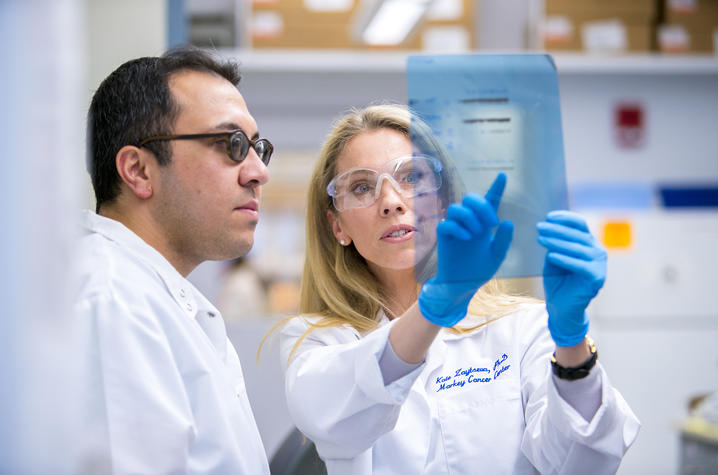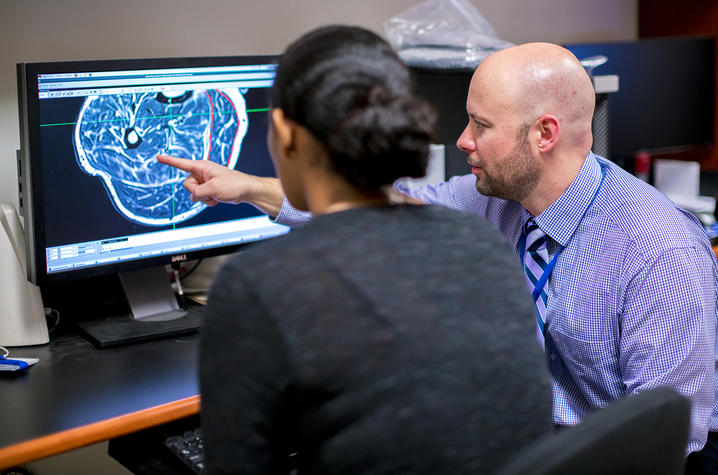UK Awarded $11.2 Million Grant to Launch New Center for Cancer and Metabolism
LEXINGTON, Ky. (April 17, 2017) – The University of Kentucky was recently awarded a prestigious Centers of Biomedical Research Excellence (COBRE) grant to study the metabolism of cancer from the National Institutes of General Medical Sciences, part of the National Institutes of Health. The $11.2 million grant will fund UK's Center for Cancer and Metabolism over the next five years.
Kentucky has disproportionately high incidences of both cancer and metabolic disorders and leads the nation in cancer deaths and is in the top 10 for highest obesity rates in the country. While scientists have long known of a direct link between obesity and cancer, the need for further research into this field is a necessity for Kentuckians.
Senate Majority Leader Mitch McConnell, an advocate of the 21st Century Cures Act, contacted NIH Director Francis S. Collins on behalf of UK's grant application.
“In an effort to improve health care access and outcomes for my constituents, UK has long made a priority of undertaking important research specific to Kentucky and the Appalachian region," Senator McConnell said. "Over the years, UK and its Markey Cancer Center have developed one of the strongest cancer research, prevention and treatment programs in the country, as demonstrated by the Center’s 2013 NIH National Cancer Institute designation, which I was proud to support. I was also pleased to assist UK in securing this competitive grant to advance and strengthen this critical health research for Kentucky by enabling advanced research focusing on the development of novel therapies for cancer treatment."
Kentucky Congressman Andy Barr echoed McConnell's sentiments, noting that support and funding for innovative cancer research remains a priority.
“The awarding of this competitive grant is a recognition of the University of Kentucky as a national leader in biomedical research,” said Congressman Barr. “I have consistently supported the National Institutes of Health because these investments not only contribute to our local communities and institutions, they will improve and even save lives by advancing new treatments and cures. I am confident the health care services provided by the NCI-designated Markey Cancer Center and the research done by UK scientists funded by this grant will help us to find better ways to fight cancer, which will benefit patients and families in Kentucky and around the world.”
UK's Center for Cancer and Metabolism (CCM) capitalizes on highly specialized institutional strengths in cancer and advanced metabolomics tools to focus on the underlying mechanisms that link dysfunctional metabolism to cancer. Recent studies have shown that the metabolic powerhouse of cells – the mitochondria -– can influence how aggressive a cancer becomes.
UK has internationally renowned experts in the field of cancer and metabolism, and new state-of-the-art technology has improved the ability to understand how metabolism impacts cancer.
"As the University for Kentucky, we are uniquely positioned to conduct this level of sophisticated research thanks to the presence of a diverse array of biomedical researchers, clinicians and our leading academic medical center,” said UK President Eli Capilouto. “Research and development is at the core of economic and human development, and it is why UK is Kentucky’s most instrumental change agent, health provider and economic engine. The progress we make offers the brightest future and best hope for Kentucky.”
The CCM will bring together highly complementary disciplinary strengths at UK in cancer, metabolism and data sciences, coupled with sophisticated metabolomics tools and advanced cancer imaging capabilities, to strengthen the university’s cancer research enterprise by providing a thematically focused multidisciplinary infrastructure dedicated to defining the role of metabolism in the development and treatment of cancer.
"Research is at the heart of any progress we hope to make in bridging health gaps in the Commonwealth," said Lisa Cassis, UK vice president for research. "Increased funding opportunities through the 21st Century Cures Act, and in particular this COBRE focused on cancer and metabolism, will enable the university to foster the development of the next generation of scientists who will lead our efforts in translating basic research findings into promising new therapies.”
COBRE grants also use this platform to develop promising early-stage investigators with enhanced skill sets in exciting new areas of cancer research and to enhance their success in competing for NIH grant support. The grant promotes collaborative, interactive efforts among researchers with complementary backgrounds, skills and expertise.
Four junior investigators, mentored by teams of clinicians and scientists from a variety of disciplines, departments and colleges at UK, will lead major projects investigating an aspect of cancer metabolism:
- "Role of vitamin D in protecting against cachexia in cancer patients," led by Travis Thomas, Department of Clinical Sciences, UK College of Health Sciences
- "Role of serine biosynthesis pathway in breast cancer," led by Yadi Wu, Department of Pharmacology and Nutritional Sciences, UK College of Medicine
- "Role of RORα in breast cancer metastasis,” led by Ren Xu, Department of Pharmacology and Nutritional Sciences, UK College of Medicine
- "Role of fatty acid synthase in colorectal cancer," led by Kate Zaytseva, Department of Toxicology and Cancer Biology, UK College of Medicine
The CCM is co-led by program directors Daret St. Clair, professor and James Graham Brown Foundation Endowed Chair in the UK Department of Toxicology and Cancer Biology, and Peter Zhou, professor in the UK Department of Molecular and Cellular Biochemistry.
"Having the kind of environment where learning and collaboration are placed at the forefront is why we were chosen for this grant, and we hope to continue that throughout the life of this center," St. Clair said. "It will also enable us to reach out to new and talented researchers who want to come to UK to become new project leaders and continue the work we're doing."
The scientific discoveries achieved through the CCM will continue to help the UK Markey Cancer Center in its mission to conquer cancer in the Commonwealth. As Markey prepares to renew its National Cancer Institute Cancer Center designation, and simultaneously compete to become a Comprehensive Cancer Center later in 2017, Markey director Dr. Mark Evers emphasizes the need for increased cancer research funding and continuing to push for new discoveries.
"Nowhere in the country is it more important to have this level of cancer research underway," Evers said. "Kentuckians face a unique set of health issues, but we at the UK Markey Cancer Center are distinctly positioned to help solve the problem. Being an NCI-designated cancer center means being a leader in research as well as clinical care and outreach. This funding will allow us to translate our findings into potential new therapies for cancer patients from Kentucky and beyond."
The CCM leverages expertise with mentors and collaborators from across multiple UK centers, disciplines and departments. The multidisciplinary collaboration is indicative of the type of work ongoing at UK and UK HealthCare every day.
“This new funding is another example of the vital importance to the people of Kentucky - and this region - in having an academic medical center at the University of Kentucky,” said Dr. Michael Karpf, UK executive vice president for health affairs. "The synergy and collaboration between researchers and clinicians to further studies in cancer can only be done at a place like this, where people are working together to make a difference in the lives of patients now and for generations to come.”






